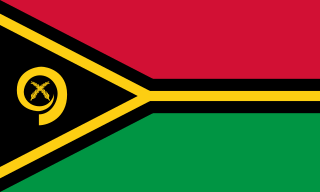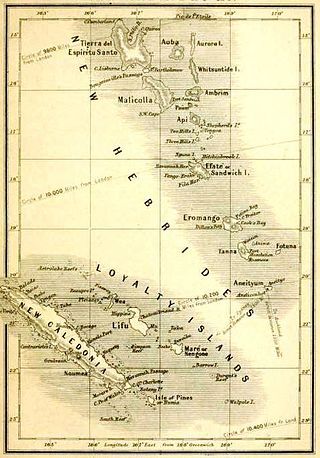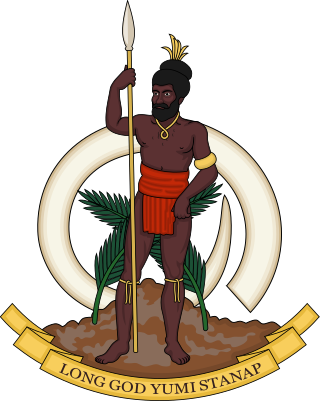
Vanuatu, officially the Republic of Vanuatu, is an island country in Melanesia, located in the South Pacific Ocean. The archipelago, which is of volcanic origin, is 1,750 km (1,090 mi) east of northern Australia, 540 km (340 mi) northeast of New Caledonia, east of New Guinea, southeast of Solomon Islands, and west of Fiji.

The history of Vanuatu spans over 3,200 years.

The politics of Vanuatu take place within the framework of a constitutional democracy. The constitution provides for a representative parliamentary system. The head of the Republic is an elected President. The Prime Minister of Vanuatu is the head of government.

New Hebrides, officially the New Hebrides Condominium and named after the Hebrides in Scotland, was the colonial name for the island group in the South Pacific Ocean that is now Vanuatu. Native people had inhabited the islands for three thousand years before the first Europeans arrived in 1606 from a Spanish expedition led by Portuguese navigator Pedro Fernandes de Queirós. The islands were named by Captain James Cook in 1774 and subsequently colonised by both the British and the French.

Walter Hadye Lin̄i was a Raga Anglican priest and politician who was the first Prime Minister of Vanuatu, from independence in 1980 to 1991. He was born at Agatoa village, Pentecost Island. On his mother's side, he was a descendant of the high chief Virasangvulu, while on his father's side, he was descended from the famous weaver, Nuenue, as well as from the high chief Viralalau.

The flag of Vanuatu was adopted on 18 February 1980.

Women's suffrage – the right of women to vote – has been achieved at various times in countries throughout the world. In many nations, women's suffrage was granted before universal suffrage, in which cases women and men from certain socioeconomic classes or races were still unable to vote. Some countries granted suffrage to both sexes at the same time. This timeline lists years when women's suffrage was enacted. Some countries are listed more than once, as the right was extended to more women according to age, land ownership, etc. In many cases, the first voting took place in a subsequent year.
Frederick "Fred" Karlomuana Timakata was a Ni-Vanuatu politician who served as the president of Vanuatu from 1989 to 1994.

Nagriamel is a political party in Vanuatu.

Ati George Sokomanu, is a Vanuatuan politician who served as the first president of Vanuatu from 1984 to 1989.

The French Republic and the Republic of Vanuatu have long-standing bilateral relations which have varied over the years between tense and amicable. Vanuatu, then known as the New Hebrides, was a Franco-British condominium from 1906 to 1980, and maintained formal relations with both of its former colonial masters after gaining independence. Franco–Vanuatuan relations were rocked by a series of crises in the 1980s, and broke down completely on several occasions, with Vanuatu expelling the French ambassador in 1981, in 1984 and in 1987. Relations improved from the 1990s onwards and, today, France provides development aid to Vanuatu. The two countries also share amicable economic and cultural relations; both are members of the Organisation internationale de la Francophonie.

General elections were held for the first time in the New Hebrides on 10 November 1975. The result was a victory for the New Hebrides National Party, which won 17 seats in the new Representative Assembly.

Early general elections were held in the New Hebrides on 29 November 1977 following the dissolution of the Representative Assembly elected in 1975 due to the Vanua'aku Pati blocking its work in order to protest the inclusion of members elected by the Chamber of Commerce.

General elections were held in the New Hebrides on 14 November 1979 for the seats in Representative Assembly, the last before independence the following year. The result was a victory for the Vanua'aku Pati, which won 25 of the 39 seats, with its partner party Natui Tanno winning one. Voter turnout was 90.3%.

Alexis Yolou was a New Hebridean politician. He was elected to the Representative Assembly in 1979 from the Tanna constituency, but was killed the following year as part of the civil strife on Tanna that resulted from the landslide victory of the Vanua'aku Pati.
Mary Laufa Gilu is a Vanuatuan former politician. She and Tessa Fowler were the first women elected to the New Hebrides Representative Assembly, serving from 1975 to 1977.

Jamaica is the first English-speaking country in the Caribbean to achieve universal adult suffrage and grant women the right to be elected to Parliament. Between 1944 and 2020, a total of 47 women have been elected as members of the House of Representatives. As of September 2020 there are 18 women in the House of Representatives, the highest ever. This is a new all-time high at 29% and is the first time that female representation in the House of Representatives stands at more than a quarter of the total membership.
Tessa Fowler is a Vanuatuan former politician. She and Mary Gilu were the first women elected to the New Hebrides Representative Assembly, serving from 1975 to 1977.
Ni-Vanuatu nationality law is regulated by the 1980 Constitution of Vanuatu, as amended; the 1980 Citizenship Act, and its revisions; and various international agreements to which the country is a signatory. These laws determine who is, or is eligible to be, a national of Vanuatu. Ni-Vanuatu nationality is typically obtained under the principle of jus sanguinis, i.e. by birth in Vanuatu or abroad to parents with ni-Vanuatu nationality. It can be granted to persons with an affiliation to the country, or to a permanent resident who has lived in the country for a given period of time through naturalisation. Vanuatu has had several programs that grant honorary citizenship by investment. Nationality establishes one's international legal identity as a member of a sovereign nation. Though it is not synonymous with citizenship, for rights granted under domestic law for domestic purposes, the United Kingdom, and thus the commonwealth, have traditionally used the words interchangeably.











